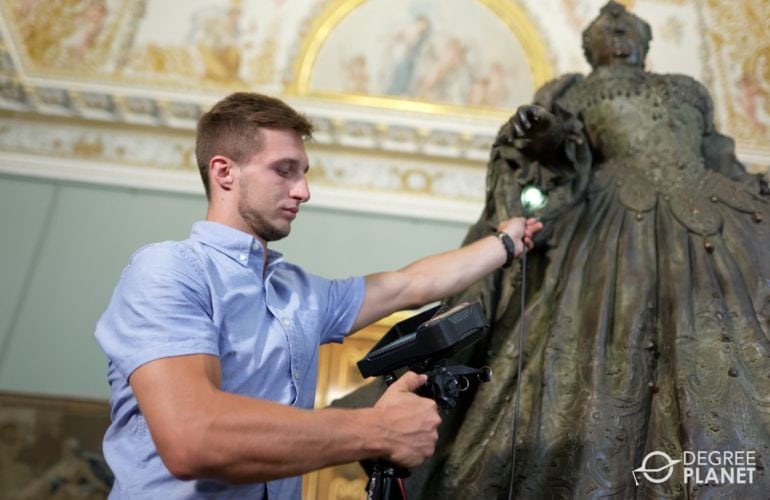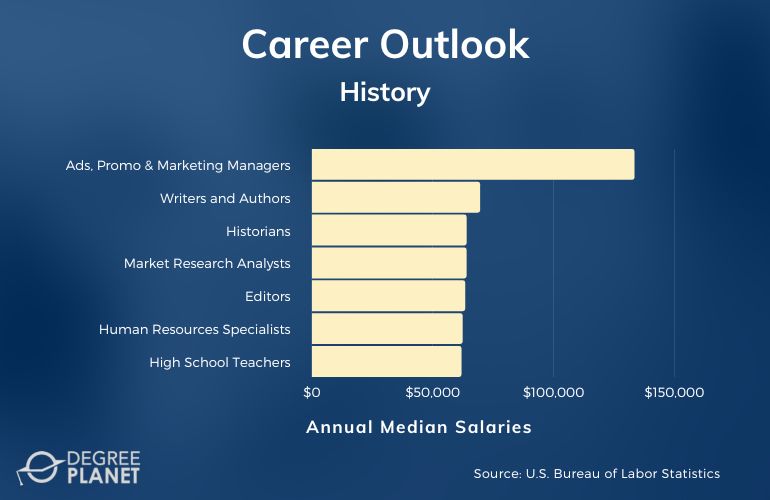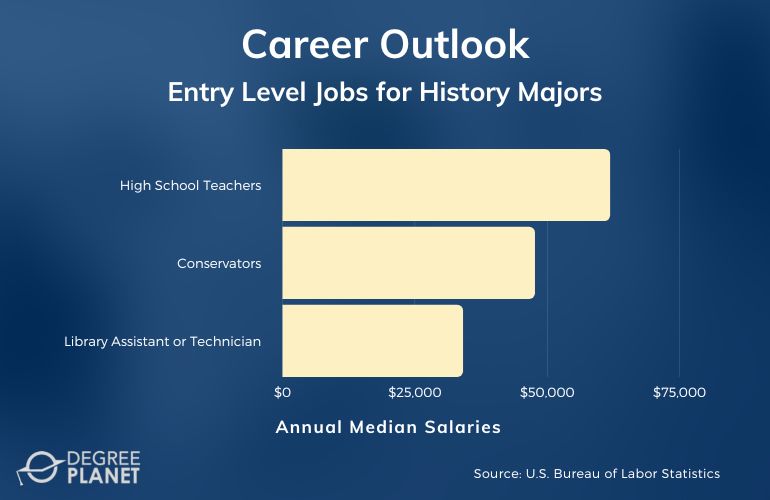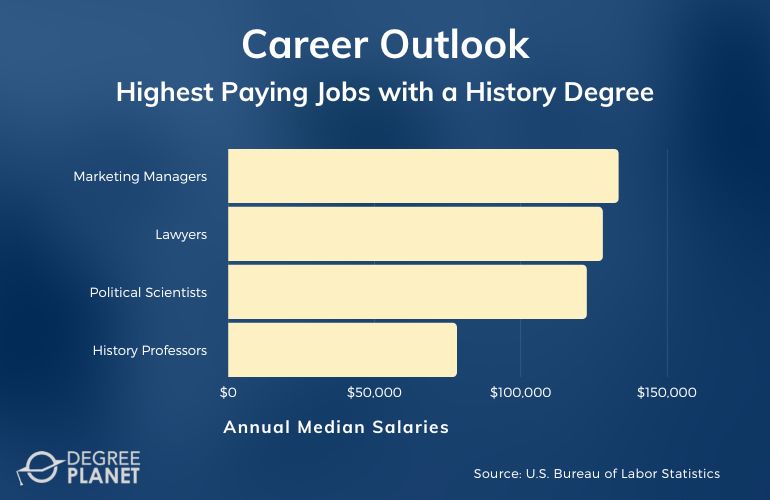Perhaps you love to read about history and think it would be an interesting college major, but you’re wondering, “What can you do with a history degree?”

History may seem like an obscure major at first, but you’ll find that this degree program can equip you for a wide variety of career tracks.
Editorial Listing ShortCode:
Whether you’re interested in writing, education or research, you may discover that there are plenty of careers with a history degree that could be right for you.
What Can You Do with a History Degree?

There are some history major careers that you can do with a bachelor’s degree and others for which you’ll need a master’s degree or higher.
With your history bachelor’s degree, you could pursue work in a museum or at a historical site. Some graduates work as guides, collections specialists, or program coordinators. Another idea could be to work in a library. Library assistant and technician roles are often open to people with bachelor’s degrees.
Editorial Listing ShortCode:
Teaching is a popular job option for people with history degrees. For most public teaching positions, it’s necessary to also take education classes and hold a state license. Some history majors become journalists or other types of writers. Authors may write articles, nonfiction books, or historical novels.
If you’re interested in law, you could earn your paralegal certification and work in that field. Your history degree could also help you enter the business world as a marketing, advertising, or human resources specialist. With experience, management might be an option at some point.
If you decide to get additional education, you might eventually become a lawyer, a political scientist, a museum curator, or a librarian. Historians, archaeologists, and anthropologists are other possibilities for those with advanced degrees.
10 Things You Can Do with a Degree in History
If you study history in college, you could work in the field of historical studies or apply your skills in a different line of work. Taking a look at the different careers for history majors may help you understand the value of this bachelor’s degree.
1. History Teacher

If you love history, you might want to pass your passion on to others. Social studies teachers at the middle school and high school levels may lead classes in world history, American history, government, civics, or geography.
Most public school jobs require licensure, which is administered by the state. If you choose to earn a graduate degree, you might eventually become a college history professor.
2. Museum Technician

Many museums focus on educating the public about historical events and cultures of the past. As a museum worker, you might take care of the items in a museum’s collection. Your job could also include answering people’s questions, giving tours, or putting on special programs.
Other museum-related jobs include being a curator, an archivist, or a conservator. To advance into those roles, it’s often necessary to hold a master’s degree. It may be worth noting that a growing number of universities offer masters in history programs online as well as on campus.
3. Journalist

The things that happened in the past often influence current events. Your knowledge of history could help prepare you to work as a journalist or a reporter who keenly understands what’s going on in the world.
Journalists may work for newspapers, magazines, websites, television stations, or radio stations. They may conduct interviews, research situations, pitch story ideas, and write engaging articles or broadcast copy.
4. Paralegal

People who study history in college often enter careers in the legal field, such as being a paralegal. Working as a paralegal, you might support lawyers by doing research, filing paperwork, keeping track of evidence, speaking with clients, and handling a variety of other tasks.
Paralegals often benefit from formal training in this field, so you might want to complete a preparatory course and pursue industry certification.
5. Author

Being a writer could give you an outlet for sharing ideas about history with others. Both kids and adults can enjoy history books and articles.
Editorial Listing ShortCode:
Whether you’re interested in fiction or nonfiction writing, your history training might be helpful. If you want to write for students, you might be able to prepare history textbooks or other curricular material. Editing other authors’ history-themed writings could be an alternative job to consider.
6. Human Resources Manager

In a history program, you’ll spend a lot of time doing research, analyzing facts, and paying attention to details. Those skills could help you secure a job in human resources. In that role, you might be in charge of coordinating workplace talent and overseeing benefit programs.
When you first enter the HR field, you might work as an assistant or a specialist. Eventually, you might be able to advance to a management role.
7. Market Research Analyst

History majors are researchers. That skill could translate to a career as an analyst, especially if your college studies include coursework in quantitative analysis.
Market research analysts use their research abilities to make decisions about product decisions and sales. They pay attention to consumer trends and evaluate data. Their findings may influence business decisions, such as what products to develop or which geographic areas to expand into.
8. Advertising Manager

Not only can history majors be market researchers, but they may also be successful as managers in marketing or advertising.
For one thing, studying history helps you learn what humans are like. Understanding people well could help you cater to their fundamental desires with your products or services. Also, history classes involve a lot of writing. Being good with words can help you successfully craft compelling ad copy.
9. Library Technician

Books are an invaluable source of knowledge about the past, so people who are passionate about history often love books.
If that describes you, then you might want to work in a library. You could organize materials, match patrons to books they’d enjoy, or help people do research. With a bachelor’s degree, you’re most likely to work as an assistant or a technician. Being able to use the “librarian” title often requires a master’s degree.
10. Project Manager

In college, you’re going to do research projects. That requires organization and methodology. After completing your schooling, you might be able to put those skills into practice as a project manager.
Editorial Listing ShortCode:
Many businesses and industries hire project managers to oversee various developments or processes, including the personnel and budgets involved. You could consider being a project manager in business, community development, construction, or another field.
History Careers & Salaries

Studying history could lead to a wide variety of careers, but there are some key areas to which many history majors gravitate.
Working as a historian could be a top goal for many graduates. To do that job, it’s often necessary to get a history master’s degree after completing your undergrad. Museum careers are popular among history students too. Potential careers include archivist, curator, or museum technician. Many roles require a master’s degree in addition to a history bachelor’s degree.
History is closely associated with other disciplines, such as archaeology and anthropology. With additional studies, you could consider becoming a professional who studies the past by examining artifacts and other clues.
According to the Bureau of Labor Statistics, here are the median salaries of some positions related to the study of history.
| Careers | Annual Median Salaries |
| Advertising, Promotions, and Marketing Managers | $133,380 |
| Writers and Authors | $69,510 |
| Historians | $63,940 |
| Market Research Analysts | $63,920 |
| Editors | $63,350 |
| Human Resources Specialists | $62,290 |
| High School Teachers | $61,820 |
| Social Science Research Assistants | $49,720 |
| News Analysts, Reporters and Journalists | $48,370 |
| Museum Technicians and Conservators | $47,630 |
After earning a history bachelor’s degree, you could choose to take your career in another direction by getting a graduate degree in a field like law, business, or political science.
Some history graduates plan to teach middle or high school students. A state teaching license is usually needed for those roles. Another option is to teach history at the college level. That position requires at least a master’s degree and often a PhD. Some history experts become writers. For example, they might write historical fiction or nonfiction for kids or adults.
Writing or editing history textbooks might be an option as well. Also, history knowledge could be a useful foundation for a career as a journalist who reports on local or world events.
How to Know If a Degree in History Is Right for Me

Everyone can learn from history, but that doesn’t mean that everyone’s cut out to be a history major. Knowing what skills and personality traits are beneficial in this field may help you decide whether to choose this degree program.
- You are a reader. There is a lot of reading involved in college history programs. Before committing to this major, it’s helpful to evaluate how you’d feel about a heavy reading load.
- You are an effective writer. Writing is one of the top skills needed in a history degree program. You can develop your abilities throughout the program, but being a competent writer from the outset could help you get started on the right foot.
- You enjoy thinking deeply about topics. History majors don’t just read about history. They also apply a critical eye to historical evidence to draw conclusions about what happened in the past and how its lessons could apply to the present.
- You’re interested in a minor. History students often round out their studies by minoring in a field like religion, criminal justice, art history, or anthropology. A concentration for your history bachelor’s degree could be another option for specialization.
- You’re okay with career ambiguity. Nursing majors almost always become nurses. History majors don’t always become historians, though. If you’re searching for a major that doesn’t lock you into one clear career track, then history studies could be a strategic choice.
If these characteristics describe you, then you might be a good fit for history jobs and education.
How to Become a Historian

There are many history degree careers for people with a bachelor’s degree alone, but if your career goal is to become a historian, you’ll typically need more education. Here are some common steps in the process to becoming a historian:
- Explore college programs. Your path toward becoming a historian begins with learning what’s out there for history studies. You may want to compare different schools and the preparation that they’d offer you for future work and education.
- Earn a bachelor’s degree. You can begin studying history during your undergraduate program. You can develop your research and writing skills, and you may get to delve into a favorite era of history during elective classes.
- Gain experience. To prepare for working in this field and position yourself as a promising candidate for grad school, it’s strategic to complete a history internship. Whether paid or unpaid, internships add valuable experience to your resume.
- Go to grad school. To work as a historian, it’s necessary to hold at least a master’s degree. As you earn your graduate degree in history, you might pursue a concentration like public history, American history, or European history.
- Consider getting a doctorate. While not essential for becoming a historian, having a doctoral degree in the field could increase the job opportunities available to you. With a PhD, you might be able to work as a history researcher or a professor.
The more you’re willing to explore and learn, the further you can go in your history career. Internships, educational travel, research projects, classes, and more can increase your knowledge, fuel your passions, and contribute to a well-rounded, fulfilling career.
Is Financial Aid Available?

You may be able to secure funding for your history studies. Both government and private aid might be available.
To begin the financial aid process, you can fill out the Free Application for Federal Student Aid (FAFSA). You might be able to receive government aid from not only the federal government but also your state. Common funding options include loans and grants.
There are other funding sources available, too. School-based scholarships are helpful for many students. Others secure tuition help from their employers or apply for scholarships from outside organizations, such as historical societies or community service agencies.
What Is a History Degree?

A history degree is a college program for students who want to explore the past. At the bachelor’s degree level, a history degree is usually a four-year program.
During history studies, students don’t only find out what happened on certain dates long ago. They learn to ask questions, consider perspectives, and explore a deeper understanding of the past. History degrees involve a lot of research, reading, and writing. This degree program also emphasizes critical thinking.
History majors sometimes specialize in a particular subfield related to time periods, people, or areas of the world.
What Skills Do You Learn in a History Degree?

History majors do a large amount of reading. You could improve your ability to read critically during this class, and you’ll be exposed to a wide variety of texts. In a history program, you will also do a great deal of writing. Earning this degree should sharpen your writing skills, and you may have developed excellent communication skills by graduation.
Research is another key emphasis of history studies. You’ll learn about research methods for this field and about tools, such as digital resource libraries, that can help you find information. In addition, this type of program may equip you for teaching history to others.
Is History a Good Major?

Yes, history is a good major for many undergraduate students. Majoring in history could help prepare you to work in a museum, a library, a research center, or a school.
This undergraduate degree could also provide a strong foundation for graduate studies. Museum technicians and conservators typically earn between $29,130 and $79,780 annually (Bureau of Labor Statistics). That range includes people who work at historical sites.
Historians usually make between $37,310 and $118,380. Those who work for the federal government have a median annual salary of $101,910. Most historians hold at least a masters in the field, but a bachelors may help you qualify for entry-level positions.
Where Do History Majors Work?

People who graduate with degrees in history often pursue work in settings where they can teach and guide others.
Museums and historical sites are prime examples. The job possibilities—which vary based on educational attainment—could include being a curator, a collections specialist, or a tour guide. Libraries could be another place for history majors to work. Also, those with teaching licensure could become history or social studies teachers.
Some people in the history field work for government agencies. That may include local, state, or federal government jobs. History majors could also be writers for curriculum companies, marketing agencies, or news outlets.
What Is a Historian?

A historian is a professional who studies the past. Often, historians do more than simply learn what happened during a time period or an event. They also provide analyses or use their findings to inform current policies or decisions.
Historians are researchers. They dig into sources to gain as much information as possible about particular people, places, or events. Their research may be on behalf of a government agency, an educational institution, or an independent organization.
Historians can also be educators. Whether they work in schools, museums, or libraries, they may connect people to information about history.
Are Historians in Demand?

According to the Bureau of Labor Statistics, a 4% growth rate is expected for historian positions over the next ten years. That means that historian jobs will keep up with the average growth rate across all job sectors.
Museum jobs are expected to grow more quickly during this time, with a projected 12% growth rate. Curators, conservators, and museum technicians will be especially in demand. Teaching is a line of work that’s always needed. It’s expected that there will be a steady growth rate of 5% for teaching jobs in high school education.
What Do Historians Do?

Historians conduct research. They examine artifacts or read primary sources to learn what happened long ago, and they analyze their findings to make conclusions about people or events. Often, historians offer this information to others through reports, presentations, books, school lessons, or museum exhibits.
Studying the past doesn’t just tell historians what has already happened. It also sheds light on current events. Historians may use their analytical skills to make recommendations about a current course of action, such as a military strategy or a proposed public policy.
It may be worth noting that a number of universities offer on-campus as well as online military history degree programs for students wishing to specialize in this area.
What Are Some Entry Level Jobs for History Majors?

After graduating with a degree in history, some people get jobs in libraries. Entry-level opportunities could include being an assistant or a technician. The Bureau of Labor Statistics says that those roles pay a median annual salary of $34,050.
If you have a teaching license, you can start a teaching career in K-12 public or private schools right after graduating. High school teachers make a median of $61,820 per year. Being a museum technician could be another entry-level option. The Bureau of Labor Statistics groups those professionals together with conservators, with a median salary of $47,630.
What Are the Highest Paying Jobs with a History Degree?

Figures from the Bureau of Labor Statistics show that the median annual salary for history professors is $78,130.
Sometimes, history studies lead to careers in political science. Political scientists have a median salary of $122,510. History graduates could also enroll in law school. The median salary for lawyers is $127,990 annually. Another option is to start a career in advertising or marketing.
The median annual salary for advertising, promotions, and marketing managers is $133,380. Qualifying for one of these top-paying jobs often requires one or more graduate degrees.
Is a History Degree Worth It?

Yes, a history degree is worth it for many students. For many people, history is a fascinating topic, so the idea of studying it in college for several years could be quite intriguing. History studies could equip you with valuable skills for many industries.
As you read and analyze a variety of texts, you can learn to think critically, research effectively, and write compellingly. The Bureau of Labor Statistics projects that jobs for historians are growing at a 4% rate over the next ten years. Museum roles and college faculty positions are both increasing at 12% rates.
Getting Your Degree in History Online

If history is your area of interest, then you may be ready to start the process of becoming a historian. The first step is to earn a bachelor’s degree in the field.
You can gain a better understanding of the full scope of history and may focus on certain time periods as well. Plus, you can develop your reading, writing, and research abilities—skills that are applicable in a range of fields. Earning an accredited history degree online enables you to gain a solid education through a flexible format.
You can start your educational journey today by checking out opportunities for online history studies from accredited schools.

